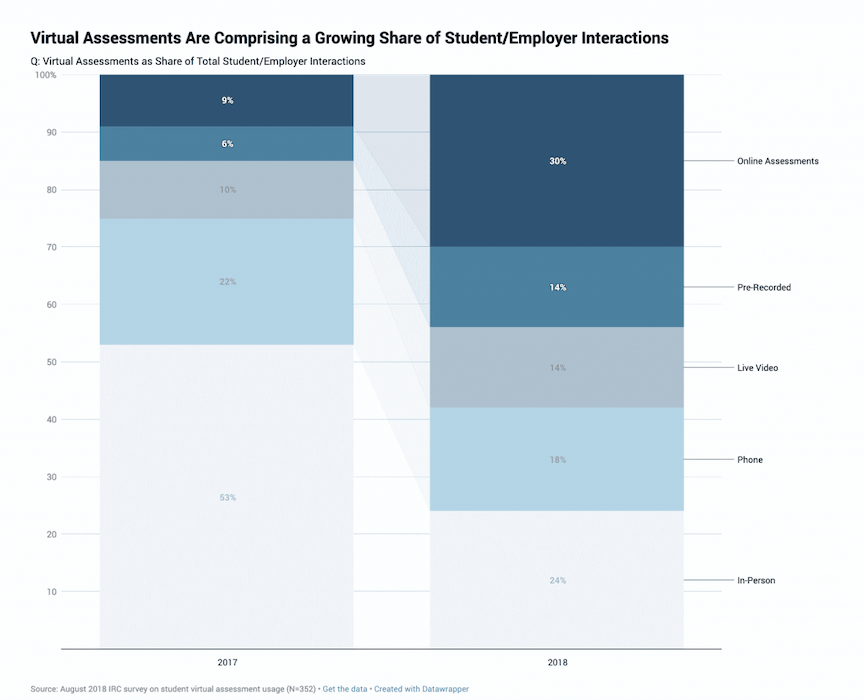What is Campus Recruitment?
- Source the best college students and up-and-coming graduates for internship and entry-level positions.
- Attract & engage college students to fill immediate job openings and to build a strong talent pipeline for the future.
- Hire college students and graduates. With more than 70% of employers planning to hire college students this year, competition is fierce.
What is campus recruitment?
Campus recruitment is a strategy for sourcing, engaging and hiring young talent for internship and entry-level positions. College recruiting is typically a tactic for medium- to large-sized companies with high-volume recruiting needs, but can range from small efforts (like working with university career centers to source potential candidates) to large-scale operations (like visiting a wide array of colleges and attending recruiting events throughout the spring and fall semester). Campus recruitment often involves working with university career services centers and attending career fairs to meet in-person with college students and recent graduates. Some industries participate in campus recruiting more than others; finance, technology, business consulting, manufacturing and engineering are a few of the most popular.
Why campus recruiting is more important than ever
The labor market is beyond tight. A talent shortage is a top concern for most companies. As a result of the digital revolution, how work gets done is changing; it’s projected that 85% of jobs in 2030 don’t even exist yet. And the newest generation of workers – known as potentially the best educated generation – is graduating from college with their own priorities and values about work, employers and more.
With nearly 20 million people attending college in the U.S., students make up a valuable labor pool to address immediate staffing needs and to serve as a pipeline of talent for the future.
Who is involved with campus recruiting?
Employers, college campus career placement staff, experts in a variety of related fields and college students all touch campus recruiting in one way or another.
The main players:
- Employers: While most employers tap into college talent to meet staffing requirements, the greatest ongoing need stems from medium- and large-sized companies with high-volume recruiting needs.
- Campus recruiters: Depending on priorities and bandwidth, some companies have dedicated campus recruiters whose sole job is to source, engage and hire interns and college grads. Others incorporate campus recruiting into HR specialist job responsibilities. However, corporate campus recruiting efforts doesn’t end with a company’s talent acquisition experts.
- University career development centers: Most colleges offer some form of career services to students and alumni. They market this as part of their value proposition to attract students to their schools and usually have staff dedicated to help students transition to the work world as interns and upon graduation. (Some even offer job search help to alumni.)
- College students: Finally, there are the college students themselves. Many start the job search at the same time they start college (17% apply for internships their freshman year, according to the 2019 Yello Recruiting Study). Just 10% wait until they graduate to begin looking for work, so it’s important to start building relationships early so that your organization is top of mind come graduation.
Other key roles:
- Representatives from other HR disciplines – like learning and development, performance, benefits and pay, diversity and inclusion, legal and more – must ensure their areas of responsibility are evolving to attract and retain Gen Z as part of an employer’s brand and value proposition.
- Hiring managers and business leaders are usually involved in defining job descriptions, interviewing, assessing, offer and hiring processes.
- Employees from other corporate functions like IT, marketing, law and more are typically pulled into projects relating to both campus recruiting and their respective areas of responsibility. For example, an organization adopting new campus technologies needs representatives from HR and IT to ensure a smooth implementation and rollout. An organization reinvigorating an employment brand will likely involve marketing department staff to ensure alignment with the company’s overall brand.
- Recruitment marketing firms help companies develop and launch employer brands, giving prospective hires insight into what it’s like to work for their organizations.
- Campus recruitment software platforms offer digital solutions to replace time-intensive, non-value-added work traditionally part of recruiting. Recruiting, consulting and other businesses are jumping on the bandwagon to help organizations compete and win Gen Z talent.
What does a campus recruiter do?
While many people in a company may have some impact on college hiring practices, a campus recruiter is often dedicated full-time to finding, engaging and hiring college students for internships or entry-level positions. This requires a broad array of skills encompassing strategy, technology, marketing, relationship building and more.
Depending on how an organization defines the role, a campus recruiter may be involved in:
- Defining intern and entry level staffing needs
- Developing a campus recruitment strategy, including budget and calendar of events
- Creating job descriptions, interview questions and formats, assessment tools and job offers
- Building relationships with campus career services staff
- Promoting their company and its job opportunities to college students
- Preparing presentations, videos and marketing collateral
- Attending and facilitating recruiting events or career fairs in-person and virtually
- Moving candidates through the interview, assessment, offer, hiring and onboarding processes
- Managing talent communities and ongoing communications
- Measuring success and defining opportunities for improvement.
For more insight into what a campus recruiter role may require at different employers, here’s a sampling of job listings for campus recruiters.
Learn how to build a successful campus recruitment strategy.
How do employers campus recruit?
In general, there are two approaches to campus recruiting: in-person and virtually.
- In-person campus recruiting means traveling to a college campus to educate students about an organization, collect resumes and meet/screen students who may fulfill talent needs. This typically takes place during on-campus career fairs or company-specific information sessions.
- Virtual campus recruiting leverages digital solutions to maintain an on-campus presence without being physically present. For example, companies may send emails and text messages to connect with students, schedule interviews using AI-enabled software, or ask students to pre-record video interviews for hiring managers to evaluate.
Why are so many employers adopting digital solutions to update campus recruiting?
With more than 70% of employers competing for talent on campus, Gen Zers know it’s an applicant’s market and have high standards when it comes to technology, time-to-hire, relationships with recruiters, job offers and more. They also have choices.
To compete and win this talent, employers are stepping up their campus recruiting efforts and employing digital solutions to expand reach, improve speed and effectiveness, and reduce costs. For example:
- BDO, an international network of public accounting, tax, consulting and business advisory firms with more than 80,000 employees working across 162 countries, saw its need for new college grads triple. Over three years, it implemented a digital strategy to improve the recruiting process and candidate experience while dramatically decrease costs.
- A.T. Kearney, a global management consulting firm, expanded its reach to 60 of the U.S. top business, engineering and liberal arts schools by adopting a digital first strategy to engage contacts from initial connection through hiring.
- Chicago Trading Company, a proprietary market-making firm, automated a number of campus recruiting tactics, resulting in a dramatic increase in reach and improved success measures.
Quick tips for campus recruiting
Maximizing your campus recruiting efforts and finding ways to improve could be a full-time job in and of itself. Technology and recruitment approaches to find, attract and hire college talent are evolving every day. Perhaps the best place to start is with the big picture:

